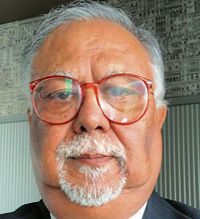India-US relations need a reality check
THE Leader of the Opposition (LoP) in the Lok Sabha, Rahul Gandhi, is on a visit to the US. The visit has few precedents. The Biden administration is giving considerable importance to it, as was evident when US Ambassador to India Eric Garcetti met Congress president Mallikarjun Kharge on September 3 to discuss the details of this trip. Enjoying the status of a Cabinet minister as LoP, Rahul is expected to meet senior officials in the US administration, business and technology leaders, diplomats, academics and members of the Indian diaspora. Not many Cabinet ministers get such wide access.
Last year, PM Modi’s state visit to the US in June had generated considerable excitement. President Biden had then described the India-US ties as “one of the most defining relationships in the 21st century”. That visit had led to several major agreements about providing technologies for manufacturing F-414 jet engines in India, setting up of new semiconductor plant, sale of 31 MQ-9B SkyGuardian drones, cooperation in other critical and emerging, space technologies and other fields.
Though it was clear even at that time that India and the US had differing positions on several issues, including the Ukraine conflict, as India had refused to criticise Russia directly in view of its close and historical ties. On the issue of human rights too, the two countries had different perspectives, though Biden had downplayed the issue when pointed questions were raised about the human rights record of the Modi government.
However, during the G20 Summit in New Delhi in September 2023, both countries showed better cooperation as India, with support from the US, was successful in forging consensus on many difficult issues such as the Ukraine war, climate change, admission of African Union as a new member and a separate agreement on the India-Middle East-Europe Economic Corridor. The G20 had emerged as a robust platform against the prevailing pessimism where the developed, socialist and developing countries could come together to negotiate on complex problems.
Serious differences, however, had begun to emerge between India and the US immediately after the summit. Biden had reportedly wanted to hold a joint press conference with PM Modi. But India was reluctant because of the possibility of Biden indulging in a veiled criticism of India’s human rights policies following the arrest of some Opposition leaders earlier. India did not want to mar a successful summit with criticism of its human rights record before G20 leaders. Biden did his presser after reaching Hanoi but nursed a grievance that he was denied that opportunity in New Delhi.
These differences on the issue of human rights deepened when Canadian PM Justin Trudeau claimed (without furnishing evidence) in September last year that there were ‘credible allegations’ of the Indian government’s involvement in the murder of Hardeep Singh Nijjar, a Khalistani activist, who was killed outside a gurdwara in Surrey in June 2023. In November 2023, the US government said it had arrested Indian national Nikhil Gupta in Prague for allegedly conspiring to assassinate another Khalistani terrorist, Gurpatwant Singh Pannun, on American soil. The US claimed that Gupta, a businessman, had tried to hire a professional killer who turned out to be an undercover US drug enforcement agent, and was acting on the advice of an Indian government employee engaged in security and intelligence work.
Since the US allegations pointed to a nexus between organised criminals, gun-runners, terrorists and others, India agreed to set up a high-level inquiry committee to investigate the matter. Over the next several months, the US made a huge fuss about “violation of human rights of an American national”, ignoring India’s concerns that Pannun was a banned terrorist who was threatening Indian organisations and prominent personalities on American soil without any restraint. These developments further impacted India-US ties as Biden declined India’s invitation to be the chief guest at the Republic Day function this year. The Quad Summit, scheduled for January in New Delhi under India’s chairmanship, was also postponed after Biden’s refusal. Various high-level visits and intensive bilateral engagement, seen in the previous year, also suffered considerably.
Amid India’s General Election earlier this year, there was criticism of the Indian government’s human rights record and charges of India’s democratic backsliding by the American and European media, NGOs and pro-government agencies. It appeared that the US government, sensitive about foreign interference in its electoral process, had let loose all its agencies to weaken the electoral prospects of the ruling party in India.
Biden was cold towards PM Modi during an informal meeting in Italy on the sidelines of the G7 Summit in June. The Biden administration also found PM Modi’s visit to Russia in July “irksome and uncomfortable”, though Modi had told President Putin that he must find a peaceful solution to the Ukraine conflict. This visit to Russia was also devoid of new substantive agreements. Washington was so disturbed by this visit that the US Ambassador in New Delhi warned India not to take its friendship with the US “for granted”.
Bangladesh’s political situation, which led to PM Sheikh Hasina’s exit, and reports of an alleged coup engineered by the CIA in collusion with the ISI further exposed the underlying differences between India and the US about their perspectives on Bangladesh. In August, American diplomats were seen meeting Opposition leaders in Jammu and Kashmir, Andhra Pradesh, Bihar and other states/UTs.
The US expects India to strongly support its foreign policy initiatives, but the latter can’t meet them due to differing interests. Because of their antagonism towards China, India’s growing economy, its need for US investments, technologies and military equipment, the two nations cannot be adversaries. However, they will need to show more mutual accommodation to maintain a decent relationship.









